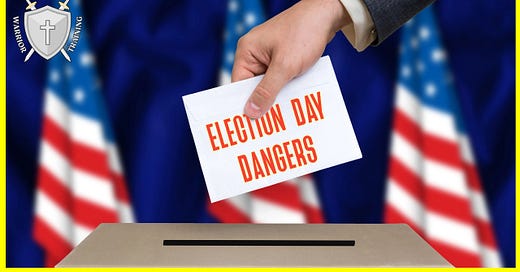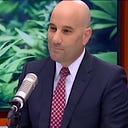Importance of Vigilance on Election Day
With Election Day approaching next week, November 5th, vigilance is more important than ever. Many churches across the nation will serve as polling locations, making them key areas to monitor. Recent threats have heightened the need for awareness—just last week, a man was arrested after planning attacks on polling stations, and ISIS has called for assaults on Christian churches and Jewish synagogues.
For church security teams, this day presents a dual responsibility: while churches may host polling sites, the primary focus for security is safeguarding church property and the members of the congregation, not the polling area itself. The goal is to ensure that all who enter feel safe and that the sanctity of the church remains intact. This Election Day is not only a time to exercise your voting rights but also to stay vigilant and uphold the safety of our communities.
Stay Alert While Voting
As Election Day approaches, with many churches acting as polling stations, situational awareness will be essential. Keeping a close eye on surroundings is a proactive way to help ensure a safe voting experience for everyone.
When approaching a polling location, be aware of your environment. Observe people’s behavior—suspicious indicators might include individuals lingering without purpose, packages left unattended, or anyone who appears overly tense or distressed. Stay alert to exits and potential escape routes, and identify any security personnel nearby.
Inside the polling area, maintain a calm, purposeful demeanor. Avoid distractions like mobile devices, which can lower situational awareness. Trust your instincts—if something feels wrong, it likely warrants attention. This awareness is not only about watching for potential issues but also knowing how to react if a situation arises.
For more detailed guidance, consider reading my article on the 7 Steps for Mastering Situational Awareness.
Security for Churches Hosting Polling Stations
Churches serving as polling stations hold a unique responsibility on Election Day. While maintaining an environment of accessibility for voters, it’s essential for church security teams to be prepared to detect and respond to potential threats. Though churches cannot interfere with election operations within the polling area, they can bolster safety on the church property surrounding it.
Church security teams can establish a visible presence near entrances and exits, ideally at a respectful distance from polling activities to avoid any perception of interference. Team members should keep an eye on parking lots and perimeter areas, watching for unusual behavior or vehicles parked inappropriately. Additionally, identifying potential hiding places around the property can be beneficial, as individuals with harmful intentions might use these areas to avoid detection.
In line with legal considerations, church security teams should ensure that no actions or procedures disrupt polling station operations. Generally, laws restrict security personnel from entering the polling space or engaging with voters within a certain distance. This reinforces the importance of stationing security team members outside the designated polling area while still allowing them to maintain oversight of the surrounding property and approach local law enforcement if they observe suspicious activity.
Legal Considerations for Church Security on Election Day
As churches hosting polling stations consider safety measures, it's essential to understand the legal boundaries to avoid interference with election operations. Laws across the U.S. are designed to protect voters’ rights, ensuring they can cast ballots free from intimidation or harassment. For example, state and federal regulations often prohibit actions that could disrupt voters or intimidate election officials in or near polling locations. Many states establish a “buffer zone” around polling places, typically between 50 to 100 feet, where electioneering or intimidation is strictly prohibited, maintaining an "island of calm" for voters to cast their ballots without external pressures.
While church security teams can monitor the perimeter and support safety outside this buffer zone, they must avoid direct interactions with voters in the polling area. Law enforcement or security presence inside polling locations can be seen as potentially intimidating, and some states have specific restrictions against visible security in the immediate polling area unless actively requested by election officials to address specific safety concerns. For a smooth operation, church security teams should stay outside the polling station boundaries but can monitor parking lots and exterior areas for any suspicious activities. This presence helps maintain property security without infringing on the legal rights of voters.
By respecting these regulations, churches hosting polling sites can ensure they provide a safe environment without risking legal violations or voter discomfort.
Practical Security Tips for Election Day
For churches serving as polling places, having a proactive security strategy on Election Day is essential. Here are practical actions that church security teams can take to maintain a secure environment:
Establish a Visible Security Presence: Station security team members near entrances and parking lots, maintaining a clear line of sight on main access points without encroaching on the polling area. This presence alone can deter potential threats and provide reassurance to voters.
Monitor Activity Around the Property: Encourage security team members to watch for unusual behavior, such as individuals lingering or vehicles parked for extended periods in unusual locations. Security teams should communicate with one another to report and assess any suspicious activity in real time.
Plan for Emergency Responses: Review emergency protocols with all security team members before Election Day. Assign clear roles for handling potential threats, including who will contact local law enforcement if necessary. Teams should be prepared for various scenarios, from potential disturbances to evacuations if a credible threat emerges.
Use Discreet Communication: Equip security team members with radios or secure messaging apps to coordinate without drawing undue attention. Clear and discreet communication is essential for managing any potential situation effectively.
Maintain Contact with Law Enforcement: Coordinate with local police or sheriff's departments ahead of time to ensure a clear understanding of your church’s role as a polling station. Establishing this connection allows for faster response times if assistance is required.
These steps will help ensure that church property remains safe, voters feel secure, and election operations proceed without interference. By prioritizing vigilance and preparedness, church security teams can provide a crucial layer of safety on this significant day.
A Call for Prayer and Preparedness
As Election Day approaches next week, it’s an opportune time to prioritize both prayer and preparation. Churches across the country play a dual role in hosting polling stations and providing a safe space for worship. In the face of recent threats, it’s essential to remember that vigilance doesn’t mean fear—it means readiness. Being prayerful about the day ahead and prepared to act responsibly are both ways to protect your congregation, your community, and your place of worship.
Election Day is not only about supporting our democratic process; it’s about upholding the peace and security of our communities. Let’s keep each other in prayer, stand watch, and stay alert. By doing so, we honor our responsibilities and ensure that our places of worship remain sanctuaries of peace and safety for all who enter.






In Florida it is prohibited to carry a concealed weapon in a polling place
I have resided here for 30 years. The previous polling place was in the basement of a church. One year the polling place was moved to a separate part of the county at a different church.
There was no visible signs of security at the municipal or primary that I'm aware of. Since the gymnasium is in a separate building on the grounds. Maybe the security team wasn't making their presence obvious.